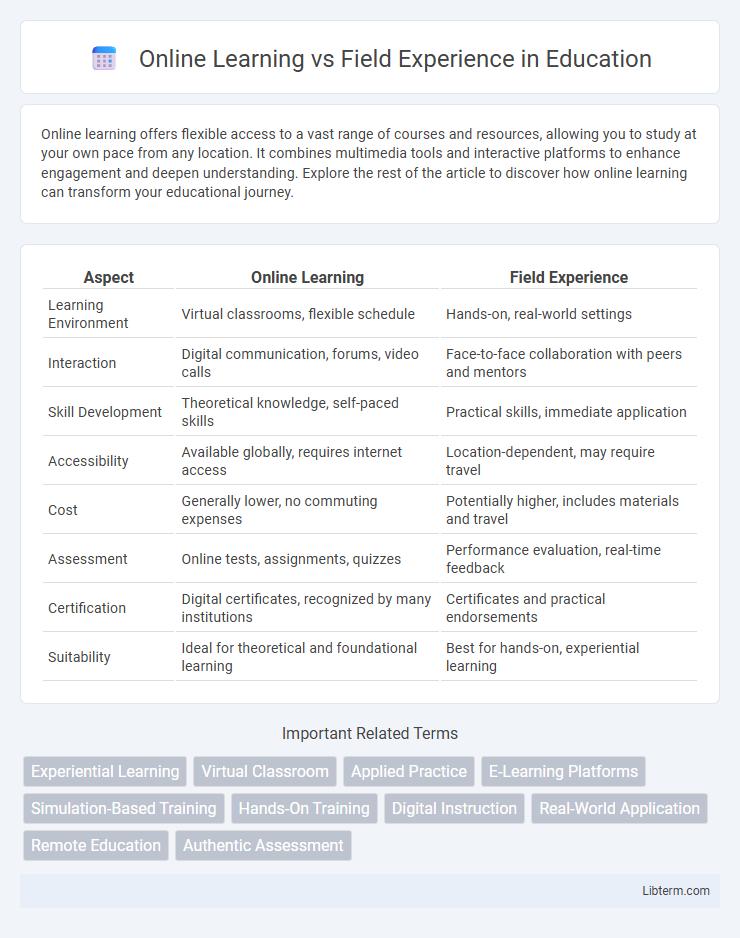Online learning offers flexible access to a vast range of courses and resources, allowing you to study at your own pace from any location. It combines multimedia tools and interactive platforms to enhance engagement and deepen understanding. Explore the rest of the article to discover how online learning can transform your educational journey.
Table of Comparison
| Aspect | Online Learning | Field Experience |
|---|---|---|
| Learning Environment | Virtual classrooms, flexible schedule | Hands-on, real-world settings |
| Interaction | Digital communication, forums, video calls | Face-to-face collaboration with peers and mentors |
| Skill Development | Theoretical knowledge, self-paced skills | Practical skills, immediate application |
| Accessibility | Available globally, requires internet access | Location-dependent, may require travel |
| Cost | Generally lower, no commuting expenses | Potentially higher, includes materials and travel |
| Assessment | Online tests, assignments, quizzes | Performance evaluation, real-time feedback |
| Certification | Digital certificates, recognized by many institutions | Certificates and practical endorsements |
| Suitability | Ideal for theoretical and foundational learning | Best for hands-on, experiential learning |
Introduction: Bridging Theory and Practice
Online learning offers flexible access to theoretical knowledge through digital platforms, enabling students to absorb concepts at their own pace. Field experience provides hands-on practice, immersing learners in real-world environments that reinforce and expand on academic foundations. Combining these methods bridges the gap between abstract theories and practical skills, enhancing overall competency and career readiness.
Defining Online Learning
Online learning refers to education delivered via digital platforms, enabling students to access courses, lectures, and materials remotely through the internet. It leverages multimedia tools, interactive modules, and virtual classrooms to facilitate flexible, self-paced study without physical presence in traditional educational settings. This mode of learning is essential for providing accessibility, scalability, and diverse learning resources across various disciplines and geographic locations.
Understanding Field Experience
Understanding field experience involves immersing learners in real-world environments where practical skills and situational awareness are developed through direct interaction. Unlike online learning, which primarily delivers theoretical knowledge via digital platforms, field experience fosters critical thinking, problem-solving, and adaptability by engaging with dynamic conditions and authentic challenges. This hands-on approach enhances retention and prepares individuals for immediate application in professional settings.
Flexibility and Accessibility Comparison
Online learning offers unparalleled flexibility, allowing students to access coursework anytime and anywhere, accommodating diverse schedules and learning paces. Field experience, while less adaptable in timing, provides hands-on, real-world exposure essential for skill development in dynamic environments. The accessibility of online platforms vastly exceeds that of field sites, making education available to a broader audience regardless of geographic or physical constraints.
Engagement and Interaction
Online learning offers interactive tools such as discussion boards, video conferencing, and instant feedback mechanisms that facilitate student engagement and peer collaboration. Field experience provides hands-on learning opportunities, real-world problem solving, and direct interaction with mentors or clients, which enhances practical skills and deeper understanding. Both methods promote engagement and interaction, but field experience delivers immersive, tactile involvement, while online learning excels in flexible and scalable communication.
Skill Development: Virtual vs Practical
Online learning offers flexible access to diverse resources and interactive simulations that enhance theoretical understanding and digital literacy skills. Field experience cultivates hands-on expertise, critical thinking, and real-world problem-solving abilities by engaging directly with practical environments and industry tools. Combining both approaches accelerates comprehensive skill development, balancing virtual knowledge acquisition with tangible, applied competencies.
Assessment and Feedback Methods
Assessment in online learning often relies on digital quizzes, automated grading, and peer-reviewed assignments, offering immediate feedback through learning management systems. Field experience assessments emphasize practical evaluations, direct observations, and reflective journals, providing personalized feedback from supervisors in real-time contexts. Combining digital tools with hands-on evaluation methods enhances the overall effectiveness of skill development and competency measurement.
Technology’s Role in Education
Technology's role in education has transformed both online learning and field experience by enabling interactive simulations, virtual labs, and real-time data analysis that enhance practical understanding. Online platforms leverage AI-driven tools and cloud-based resources to provide personalized learning paths and instant feedback, bridging gaps usually filled by physical presence. Field experience, enriched with mobile technology and IoT devices, allows students to collect and analyze data on-site, fostering hands-on skills while maintaining connectivity with educational resources.
Challenges Faced in Both Approaches
Online learning faces challenges such as limited hands-on practice, technical issues, and reduced interpersonal interaction, which hinder skill development and engagement. Field experience encounters obstacles like logistical constraints, safety concerns, and variability in the quality of real-world exposure. Both approaches struggle with maintaining consistent assessment standards and ensuring the depth of learning.
Conclusion: Finding the Right Balance
Achieving the right balance between online learning and field experience enhances skill development by combining theoretical knowledge with practical application. Online platforms provide flexible access to up-to-date information while field experience offers hands-on training essential for real-world problem solving. Integrating both methods fosters comprehensive education, preparing learners for dynamic professional environments.
Online Learning Infographic

 libterm.com
libterm.com